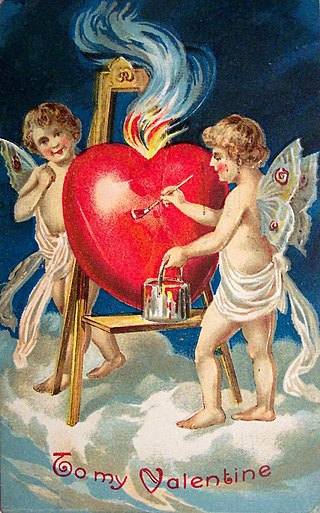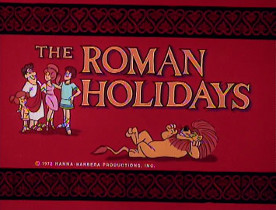 | |
| Author | Upton Sinclair |
|---|---|
| Country | United States |
| Language | English |
| Published | 1931 |
Roman Holiday is a 1931 novel by Upton Sinclair.
 | |
| Author | Upton Sinclair |
|---|---|
| Country | United States |
| Language | English |
| Published | 1931 |
Roman Holiday is a 1931 novel by Upton Sinclair.

Christmas is an annual festival commemorating the birth of Jesus Christ, observed primarily on December 25 as a religious and cultural celebration among billions of people around the world. A feast central to the liturgical year in Christianity, it follows the season of Advent or the Nativity Fast, and initiates the season of Christmastide, which historically in the West lasts twelve days and culminates on Twelfth Night. Christmas Day is a public holiday in many countries, is celebrated religiously by a majority of Christians, as well as culturally by many non-Christians, and forms an integral part of the holiday season surrounding it.

Easter, also called Pascha or Resurrection Sunday, is a Christian festival and cultural holiday commemorating the resurrection of Jesus from the dead, described in the New Testament as having occurred on the third day of his burial following his crucifixion by the Romans at Calvary c. 30 AD. It is the culmination of the Passion of Jesus Christ, preceded by Lent, a 40-day period of fasting, prayer, and penance.

The New Year is the time or day at which a new calendar year begins and the calendar's year count increments by one. Many cultures celebrate the event in some manner. In the Gregorian calendar, the most widely used calendar system today, New Year occurs on January 1. This was also the first day of the year in the original Julian calendar and the Roman calendar.

Good Friday is a Christian holiday commemorating the crucifixion of Jesus and his death at Calvary. It is observed during Holy Week as part of the Paschal Triduum. It is also known as Holy Friday, Great Friday, Great and Holy Friday, and Black Friday.

A religious festival is a time of special importance marked by adherents to that religion. Religious festivals are commonly celebrated on recurring cycles in a calendar year or lunar calendar. The science of religious rites and festivals is known as heortology.

Roman Holiday is a 1953 American romantic comedy film directed and produced by William Wyler. It stars Audrey Hepburn as a princess out to see Rome on her own and Gregory Peck as a reporter. Hepburn won an Academy Award for Best Actress for her performance; the story and costume design also won.

Saturnalia is an ancient Roman festival and holiday in honour of the god Saturn, held on 17 December of the Julian calendar and later expanded with festivities through 19 December. The holiday was celebrated with a sacrifice at the Temple of Saturn, in the Roman Forum, and a public banquet, followed by private gift-giving, continual partying, and a carnival atmosphere that overturned Roman social norms: gambling was permitted, and masters provided table service for their slaves as it was seen as a time of liberty for both slaves and freedmen alike. A common custom was the election of a "King of the Saturnalia", who gave orders to people, which were followed and presided over the merrymaking. The gifts exchanged were usually gag gifts or small figurines made of wax or pottery known as sigillaria. The poet Catullus called it "the best of days".

In the Gregorian calendar, New Year's Day is the first day of the calendar year, 1 January. Most solar calendars begin the year regularly at or near the northern winter solstice, while cultures and religions that observe a lunisolar or lunar calendar celebrate their Lunar New Year at less fixed points relative to the solar year.

Valentine's Day, also called Saint Valentine's Day or the Feast of Saint Valentine, is celebrated annually on February 14. It originated as a Christian feast day honoring a martyr named Valentine and through later folk traditions, it has also become a significant cultural, religious and commercial celebration of romance and love in many regions of the world.

Festivals in ancient Rome were a very important part in Roman religious life during both the Republican and Imperial eras, and one of the primary features of the Roman calendar. Feriae were either public (publicae) or private (privatae). State holidays were celebrated by the Roman people and received public funding. Games (ludi), such as the Ludi Apollinares, were not technically feriae, but the days on which they were celebrated were dies festi, holidays in the modern sense of days off work. Although feriae were paid for by the state, ludi were often funded by wealthy individuals. Feriae privatae were holidays celebrated in honor of private individuals or by families. This article deals only with public holidays, including rites celebrated by the state priests of Rome at temples, as well as celebrations by neighborhoods, families, and friends held simultaneously throughout Rome.
The holidays of Bosnia and Herzegovina include, in various jurisdictions:

Whit Monday or Pentecost Monday, also known as Monday of the Holy Spirit, is the holiday celebrated the day after Pentecost, a moveable feast in the Christian liturgical calendar. It is moveable because it is determined by the date of Easter. In the Catholic Church, it is the Memorial of the Blessed Virgin Mary, Mother of the Church, marking the resumption of Ordinary Time.

The Roman Holidays is a half-hour Saturday morning animated series produced by Hanna-Barbera Productions and broadcast on NBC from September 9 to December 2, 1972. It ran for 13 episodes before being cancelled, and reruns were later shown on the USA Cartoon Express during the 1980s, Cartoon Network during the 1990s, and Boomerang during the 2000s.
George's Day in Spring, or Saint George's Day, is a Slavic religious holiday, the feast of Saint George celebrated on 23 April by the Julian calendar. In Croatia and Slovenia, the Roman Catholic version of Saint George's Day, Jurjevo is celebrated on 23 April by the Gregorian calendar.
Public holidays celebrated in Spain include a mix of religious, national and regional observances. Each municipality is allowed to have a maximum of 14 public holidays per year; a maximum of nine of these are chosen by the national government and at least two are chosen locally, including patronal festivals.

Defender of the Fatherland Day is a holiday observed in Russia, Turkmenistan, Belarus, Kyrgyzstan, Kazakhstan and Tajikistan. It is celebrated on 23 February, except in Kazakhstan, where it is celebrated on 7 May. Ukraine abolished the holiday starting 1992 and, after the Revolution of Dignity, has instated the somewhat similar Defender of Ukraine Day on 1 October.
Beitza or Bei'a is a tractate in the Order of Moed, dealing with the laws of Yom Tov (holidays). It is Moed's seventh tractate in the Mishna, but the eighth in the Talmud Yerushalmi and typically fourth in the Talmud Bavli.
"Roman Holiday" is a song by rapper Nicki Minaj, released as the opening track from her second album, Pink Friday: Roman Reloaded (2012). It was written by Minaj, Larry Nacht, Winston Thomas and Safaree Samuels, and produced by Blackout (Thomas) and Pink Friday Productions. Two months prior to the album's official release, Minaj performed what many viewed as a controversial rendition of the song at the 54th Grammy Awards ceremony on February 12, 2012, which received controversy from the Catholic Church for the usage of religious imagery. Minaj was the first solo female rapper to perform at the Grammys.

Eruvin is the second tractate in the Order of Moed in the Talmud, dealing with the various types of eruv. In this sense this tractate is a natural extension of Shabbat; at one point these tractates were likely joined but then split due to length.

Roman Candle Baking Co., or simply Roman Candle, was a bakery and pizzeria–restaurant in the Richmond neighborhood of Portland, Oregon. Duane Sorenson opened Roman Candle in 2013, with a menu offering wood-fired pizza and other Italian cuisine, including sandwiches, breads, green salads, pastries, and baked potatoes. Dan Griffin and Joshua McFadden served as the baker and chef, respectively. The bakery started supplying select menu items to Sorenson's Stumptown Coffee Roasters locations in late 2015. Roman Candle received a generally positive reception, with the pizzas and kouign-amann receiving the most praise. The restaurant closed in April 2018 for renovations, ahead of a rebrand as a gluten-free and vegan cafe called Holiday, which Sorenson launched one month later.